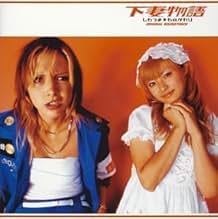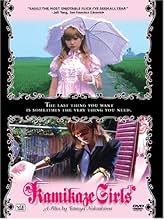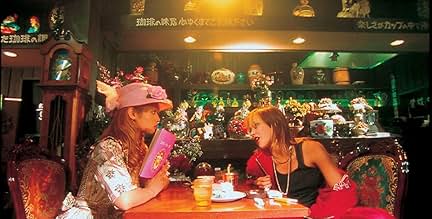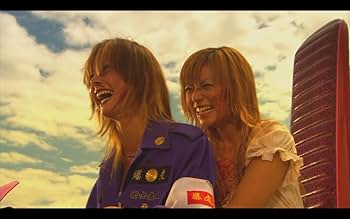AVALIAÇÃO DA IMDb
7,2/10
8,7 mil
SUA AVALIAÇÃO
Momoko, uma obcecada pela França do século 18, vira amiga de uma motociclista Yanki e as duas experimentam os altos e baixos em uma cidade rural japonesa.Momoko, uma obcecada pela França do século 18, vira amiga de uma motociclista Yanki e as duas experimentam os altos e baixos em uma cidade rural japonesa.Momoko, uma obcecada pela França do século 18, vira amiga de uma motociclista Yanki e as duas experimentam os altos e baixos em uma cidade rural japonesa.
- Direção
- Roteiristas
- Artistas
- Prêmios
- 14 vitórias e 3 indicações no total
Kyôko Fukada
- Momoko Ryugasaki
- (as Kyoko Fukada)
- Direção
- Roteiristas
- Elenco e equipe completos
- Produção, bilheteria e muito mais no IMDbPro
Avaliações em destaque
"Kamikaze Girls" is a Japanese film directed by Tetsuya Nakashima that follows the unlikely friendship between Momoko, a teenage girl with a passion for frilly Victorian-style clothing, and Ichigo, a rough-around-the-edges girl who rides a motorcycle and belongs to a biker gang. The film is a quirky and entertaining exploration of Japanese youth culture, and features strong performances from its two lead actresses.
One of the standout aspects of "Kamikaze Girls" is its unique and visually striking aesthetic. The film is a feast for the eyes, with elaborate costume design and a color palette that pops off the screen. Momoko's elaborate Victorian-style outfits are particularly memorable, and the contrast between her and Ichigo's more rough-and-tumble style adds to the film's visual appeal.
The film is also notable for its exploration of Japanese youth culture, particularly the subcultures of "Lolita" fashion and biker gangs. While the film is light-hearted and comedic in tone, it also touches on deeper themes of friendship, self-discovery, and the challenges of fitting in. The relationship between Momoko and Ichigo is at the heart of the film, and the two actresses have great chemistry, bringing a sense of warmth and authenticity to their characters.
Overall, "Kamikaze Girls" is a fun and entertaining film that is sure to appeal to fans of Japanese cinema and youth culture. Its unique aesthetic and strong performances make it a must-see for any film lover.
One of the standout aspects of "Kamikaze Girls" is its unique and visually striking aesthetic. The film is a feast for the eyes, with elaborate costume design and a color palette that pops off the screen. Momoko's elaborate Victorian-style outfits are particularly memorable, and the contrast between her and Ichigo's more rough-and-tumble style adds to the film's visual appeal.
The film is also notable for its exploration of Japanese youth culture, particularly the subcultures of "Lolita" fashion and biker gangs. While the film is light-hearted and comedic in tone, it also touches on deeper themes of friendship, self-discovery, and the challenges of fitting in. The relationship between Momoko and Ichigo is at the heart of the film, and the two actresses have great chemistry, bringing a sense of warmth and authenticity to their characters.
Overall, "Kamikaze Girls" is a fun and entertaining film that is sure to appeal to fans of Japanese cinema and youth culture. Its unique aesthetic and strong performances make it a must-see for any film lover.
Simply absurd, imaginative, unreal. A naive Kyoko Fukada in Lolita shape, fan of embroidery and Rococò and its fabulous lacy dresses , meets a bad-to-the-bone female thug that will change her life. The story is the quintessence of pop culture's exaltation, a movie so coloured that makes Cutie Honey a faded charcoal, a demential opera as much as Excel Saga, a reflection on the true importance of friends and dears.
Kyoko Fukada's acting is perfect, she makes what she does better: an ingenuous little girl. Anna Tsuchiya is a very talented actress, can't wait to see her on the new Katsushito Ishii..
Kyoko Fukada's acting is perfect, she makes what she does better: an ingenuous little girl. Anna Tsuchiya is a very talented actress, can't wait to see her on the new Katsushito Ishii..
'Kamikaze Girls' is adapted from a comic book; it contains some short animated scenes, but in fact the entire movie is made in a comic-book style, even when it employs real actors, with exaggerated physics and characterisation. It's unlikely story pairs a girl who dresses in rococo outfits with a tough biker chick (the supporting cast includes a man with a four-foot quiff); for those who aren't Japanese, it may come as a shock to learn, however, that the boutique rococo retailer that features in the film is actually a piece of product placement - it really exists, and there's some popularity to this bizarre style of dress. The film zips along, and there are some nice humorous touches, although it never feels deeper than a comic. But the tone is right for the material - and it's infinitely preferable to countless Hollywood comic adaptations that futilely try to tell us there's something profound in the their stories.
This a well-done girls' coming-of-age tale, like a Japanese 21st-century Alice in Wonderland - one Lewis Carroll would probably have liked. And I presume whoever gave the Kamikaze Girls title to the American edition would have titled the Alice work Kamikaze Alice. The underlying themes are independent thinking, the value of friendship, and the need to pursue one's creative impulses while critically evaluating surrounding people and opportunities.
Most the adult figures in the film are - in one way or another - failures. Though seen in an exaggerated, humorous, or empathetic light, they serve as guideposts to the two girls who come to realize that salvation (or "sallvation" as Ichigo misspells it for emphasis) lies not in following the crowd, not in seeking leaders' approval, but in following one's own dreams - as much as they can be realized in this limited, 3-dimensional, mortal world.
Early in the film, I feared it was headed to be too sweet, especially with the main characters being Momoko (Peaches) and Ichigo (Strawberries). But this sweetness is quickly counterbalanced with the challenges and adventures they face.
This is a fun and very unique film, good for people of all ages. In ways, it's set in a society that seems closer to the U.S. of the 1950's - around the "beat" and the James Dean eras, when youth could be wild without police being called, and yet neighborhoods could leave front doors unlocked without fear and kids could even hitch-hike - an age of greater homogeneity when America had some cultural unity and - with exception of its black-white scar - was not afraid of itself.
I obtained this film, by the way, in VCD format (not the best, but adequate), I believe, from HKFlix. I couldn't find it anywhere in DVD format.
Most the adult figures in the film are - in one way or another - failures. Though seen in an exaggerated, humorous, or empathetic light, they serve as guideposts to the two girls who come to realize that salvation (or "sallvation" as Ichigo misspells it for emphasis) lies not in following the crowd, not in seeking leaders' approval, but in following one's own dreams - as much as they can be realized in this limited, 3-dimensional, mortal world.
Early in the film, I feared it was headed to be too sweet, especially with the main characters being Momoko (Peaches) and Ichigo (Strawberries). But this sweetness is quickly counterbalanced with the challenges and adventures they face.
This is a fun and very unique film, good for people of all ages. In ways, it's set in a society that seems closer to the U.S. of the 1950's - around the "beat" and the James Dean eras, when youth could be wild without police being called, and yet neighborhoods could leave front doors unlocked without fear and kids could even hitch-hike - an age of greater homogeneity when America had some cultural unity and - with exception of its black-white scar - was not afraid of itself.
I obtained this film, by the way, in VCD format (not the best, but adequate), I believe, from HKFlix. I couldn't find it anywhere in DVD format.
Nakashima Tetsuya's wonderful "Shimotsuma Monogatari" (Shimotsuma Story) is quite a unique and charming film. I had my doubts at first but the film turned out to be a refreshing surprise. Mixing anime, quirky narrative, inventive storytelling, outrageous comedy and Japanese Pop Culture charm this movie is a really endearing movie.
Stylistically, as others have noted, it does recall movies like "Trainspotting" and "Run, Lola, Run" but I think "Shimotsuma Monogatari" is much closer in style to Yaguchi Shinobu's "Swing Girls" and "Waterboys", both of which are also really wonderful.
J-Pop singer/actress Fukuda Kyoko is infectiously cute as Momoko, the "Lolita" fashion obsessed girl with a naive yet surprising take on life. Her French 17th Century (Rocco) styled fashions are at times oddball and avant-garde and yet surprisingly cool looking that it's little wonder why American Pop Singer Gwen Stefani has drawn inspiration from this fashion trend for her L.A.M.B. fashion line and to dress her Harajuku Girls.
Anna Tsuchiya is also a wonderful surprise as Ichiko/Ichigo, the tough talking "Yanki" Sukeban with a heart of gold. She has most of the best lines in the movie and is also quite a cutie (behind the Sukeban makeup).
The only criticism I have for the film is the stupid American title "Kamikaze Girls". It really doesn't do justice to the film at all and is a real turnoff as it brings to mind a "Yakuza" film or perhaps a war picture in a stereotyping tongue-and-cheek way. Why not just call it simply "Momoko and Ichigo" (i.e. Peaches and Strawberry) or some other title that is a bit more relevant.
Other than that this film is a pure joy and delight and a welcomed change to Japanese cinema.
Stylistically, as others have noted, it does recall movies like "Trainspotting" and "Run, Lola, Run" but I think "Shimotsuma Monogatari" is much closer in style to Yaguchi Shinobu's "Swing Girls" and "Waterboys", both of which are also really wonderful.
J-Pop singer/actress Fukuda Kyoko is infectiously cute as Momoko, the "Lolita" fashion obsessed girl with a naive yet surprising take on life. Her French 17th Century (Rocco) styled fashions are at times oddball and avant-garde and yet surprisingly cool looking that it's little wonder why American Pop Singer Gwen Stefani has drawn inspiration from this fashion trend for her L.A.M.B. fashion line and to dress her Harajuku Girls.
Anna Tsuchiya is also a wonderful surprise as Ichiko/Ichigo, the tough talking "Yanki" Sukeban with a heart of gold. She has most of the best lines in the movie and is also quite a cutie (behind the Sukeban makeup).
The only criticism I have for the film is the stupid American title "Kamikaze Girls". It really doesn't do justice to the film at all and is a real turnoff as it brings to mind a "Yakuza" film or perhaps a war picture in a stereotyping tongue-and-cheek way. Why not just call it simply "Momoko and Ichigo" (i.e. Peaches and Strawberry) or some other title that is a bit more relevant.
Other than that this film is a pure joy and delight and a welcomed change to Japanese cinema.
Você sabia?
- CuriosidadesAt the part when Ichigo and Momoko are having lunch together, Momoko is holding a pink book. The title reads "How to be a Lolita" in Japanese.
- Citações
Ichigo Shirayuri: Hey, Momoko. Women shouldn't cry in public.
Momoko Ryugasaki: But there's no one here.
- Cenas durante ou pós-créditosAt the end of the film, Momoko and Ichigo pose together in a photo booth.
- ConexõesReferences Luta Sem Código de Honra (1973)
Principais escolhas
Faça login para avaliar e ver a lista de recomendações personalizadas
- How long is Kamikaze Girls?Fornecido pela Alexa
Detalhes
- Data de lançamento
- País de origem
- Centrais de atendimento oficiais
- Idiomas
- Também conhecido como
- Kamikaze Girls
- Locações de filme
- Ushiku, Ibaraki, Japão(location)
- Empresas de produção
- Consulte mais créditos da empresa na IMDbPro
Bilheteria
- Faturamento bruto nos EUA e Canadá
- US$ 34.424
- Fim de semana de estreia nos EUA e Canadá
- US$ 2.795
- 11 de set. de 2005
- Faturamento bruto mundial
- US$ 5.290.748
Contribua para esta página
Sugerir uma alteração ou adicionar conteúdo ausente






























